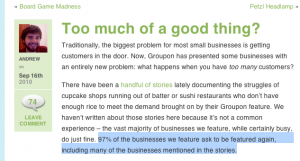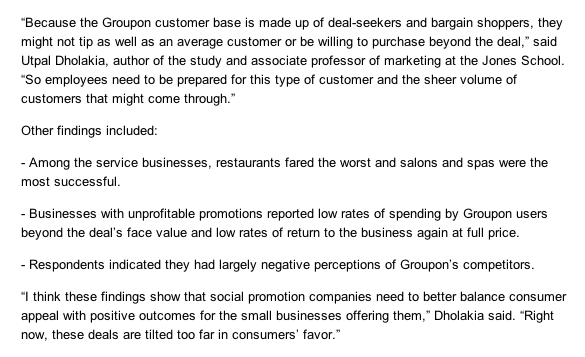Accounting for Small Business: Group Buying Deals by the numbers…
Topic: WorkingPoint News | Comments Off on Accounting for Small Business: Group Buying Deals by the numbers…
Every since the WSJ published “Groupon Satisfaction Rate Not So Hot, Study Finds“, Small Business advocates and marketing specialists have been taking a renewed interest in group buying and it’s ROI. There has always been little expectation that businesses would generate real revenue from the deals, but the compelling factor for participation was not to make a profit. What made the group buying idea compelling for businesses, especially small ones with limited resources, was the overwhelming potential to generate new customers. The advertising would be highly targeted; age, demographic, geographic location, even the types of businesses they wanted to hear from. Access to gigantic lists of potential new clients. And yet it doesn’t take an accountant to see that losing $8,000 because of offering a deal is a bad idea for a small business. But is this Groupon story the exception or the rule? WorkingPoint is an accounting software. We love accountancy. With that thought in mind we decided to take a hard look at the numbers for small businesses and group buying discounts.
According to Groupon 97% of businesses who participate ask to be featured again.
 Groupon openly acknowledges that a potential problem for many of the businesses is that offering a deal can generate too much business for a small business to handle.
Groupon openly acknowledges that a potential problem for many of the businesses is that offering a deal can generate too much business for a small business to handle.
Groupon has featured hundreds of businesses similar to Posie’s with great success and provides several examples of happy participants with the same type of business and Groupon sales:
- $4 for $8 Worth of Breakfast and Lunch Fare at FlavourSpot (2,348 sold)
- $7 for $15 Worth of Fresh Deli Fare from Elephants Delicatessen(7,206 sold)
- $7 for $15 Worth of Fresh, Wholesome Smoothies and Café Fare at Tropical Smoothie Café (1,015 sold)
This business, which offered $10 for $22 Worth of Hawaiian Fare at Aiea Grill and sold 516 deals, was extremely happy with her results:
“Who ever heard of acquiring 516 new, quality customers in one day with no money up front? You were also right about the Groupon member being a high grade customer, operating at a sophistication level far above that of the typical bargain hunter/coupon cutter. Viral, positive word of mouth would be a fantastically welcome result of this strategically targeted blast onto the Portland radar screen.We experienced 2500 hits on our website on the day of our feature. The daily average has been 35. Even on the following day residual interest it seems led to 250 hits. And then today is still high at 85.”
And while those numbers (and her experience with the deal buyers) seem very positive, and a very high ROI on both new customers and website traffic, there seems to be a glaring discrepancy in this use case. 500 deals is a small fraction of the 2,000 deals which purchased Posie’s deal.
Posie’s owner argued that the larger deal increased the negative effect it had on her ability to cover the loss of revenue generated by the deal.
Business School Study says that 40% of Businesses who participated would not participate again
Jesse H. Jones Graduate School of Business at Rice University decided to take an analytical look at Groupon, the most successful and widespread of the group buying phenomenon. The study looked at promotions offered by Groupon, which generate discount coupons for businesses which are only valid only if a minimum number of consumers purchase the deal.
The Rice study found that 66% of the 150 merchants responding found the program profitable, while 32% said they were unprofitable. Forty percent of the respondents said they would not run such a promotion again.
There’s a very clear disparity between what Groupon and the study find. It seems that certain numbers, such as initial customer visits and website traffic, have a very high ROI on these deals, but visit conversions to lasting customers, and the ability to cover costs, is more variant depending on the type of business. A look at the numbers suggests that there are some indicators you should explore before pursuing a deal for your small business.
Posie’s catastrophe with group buying is an excellent cautionary tale with some very real lessons for how to set up a deal so that it benefits your business:
- Make sure that you can cover the cost of offering it, and that you factor in every cost (not just materials, but also your time, staff time, rent, utilities and everything else that the cost of your product/services cover).
- Make sure you are prepared to accommodate the influx of new business with inventory/supplies
- Make sure you brief your staff in advance and that they are familiar with the terms of the deal
- Make sure you make the terms of the deals specific, detailed, clear and easy to enforce
- Make sure you include an expiration date
- Make sure you include a cap on the offer that reflects your ability to accommodate the influx
- Follow up with new customers! The best way to make these deals profitable for your business is to capture information, follow up with a thank you or other incentive and keep the customers you acquired coming back for more!!
